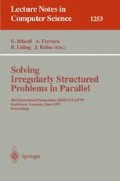Abstract
The efficient parallelisation of the finite element method is based on non-overlapping partitioning of the computational domain into an appropriate number of subdaomins. The problem size required for efficient application of parallel solution techniques is considerably large. The problem description in terms of finite element nodes and elements is complicated and difficult to handle with respect to the required main memory and file size. We describe a parallel solution method to perform mesh partitioning without prior mesh generation. The geometric description of the computational domain consists of vertices, edges and faces and boundary conditions, loads and mesh density parameters. The geometric description is recursively partitioned. The domain interfaces are minimized with respect to the number of coupling finite element nodes. Load balance is ensured for graded and locally refined meshes. Applications for two-dimensional models in structural mechanics are demonstrated.
Preview
Unable to display preview. Download preview PDF.
References
S. T. Barnard and H. Simon, A parallel implementation of multilevel recursive spectral bisection for application to adaptive unstructured meshes, Proceedings of the 7. SIAM conference on Parallel Processing for Scientific Computing 18 (1995), 627–632.
S.T. Barnard and H.D. Simon, A fast multilevel implementation of recursive spectral bisection for partitioning unstructured problems, Concurrency: Practice and Experience 6 (1994), No. 2, 101–117.
E.R. Barnes and A.J. Hoffmann, Partitioning, spectra and linear programming., Tech. Report RC 9511 (No. 42058), IBM T.J. Watson Research Center, 1982.
M. Barnett, D.G. Payne, R. van de Geijn, and J. Watts, Broadcasting on meshes with wormhole routing, Tech. report, Univ. of Texas at Austin, November 1993.
S.H. Bokhari, On the mapping problem, IEEE Transactions on Computers 3 (1981), 207–213.
R. Diekmann, B. Monien, and R. Preis, Using helpfull sets to improve graph bisections., Tech. Report RF-008-94, Universität Paderborn, June 1994.
R.v. Driesche and D. Roose, An improved spectral bisection algorithm and its application to dynamic load balancing, Parallel Computing 21 (1995), 29–48.
-, Dynamic load balancing of iteratively refined grids by an enhanced spectral bisection algorithm, Workshop Dynamic load balancing on MPP systems, Daresbury, November 1995.
-, Dynamic load balancing with a spectral bisection algorithm for the constrained graph partitioning problem, High-Performance Computing and Networking (B. Hertzberger and G. Serazzi, eds.), LNCS 919, Springer, 1995, pp. 392–397.
C. Farhat, On the mapping of massively parallel processors onto finite element graphs, Computers & Structures 32 (1989), no. 2, 347–353.
C. Farhat and M. Lesoinne, Automatic partitioning of unstructured meshes for the parallel solution of problems in computational mechanics, International Journal for Numerical Methods in Engineering 36 (1993), 745–764.
Message Passing Interface Forum, Document for a standard message-passing interface, Tech. Report CS-93-214, University of Tennessee, November 1993, Available on netlib.
G. Globisch, PARMESH a parallel mesh generator, Tech. Report SPC 93-3, DFG-Forschergruppe “Scientific Parallel Computing”, TU Chemnitz-Zwickau, Fakultät Mathematik, June 1993.
B. Hendrickson and R. Leland, A multilevel algorithm for partitioning graphs, Tech. Report SAND 93-1301, Sandia Natl. Lab., Albuquerque, NM, June 1993.
D. C. Hodgson and P. K. Jimack, Parallel generation of partitioned, unstructured meshes, Tech. Report 94/19, University of Leeds, School of Computer Studies, June 1994.
Z. Johan, K.K. Mathur, and S.L. Johnsson, An efficient communication strategy for finite element methods on the connection machine CM-5 system, Tech. Report TR 256, Thinking Machines, 245 First Street, Cambridge MA 02142, 1993.
G. Karypis and V. Kumar, A fast and high quality multilevel scheme for partitioning irregular graphs, Tech. Report 95-035, Dept. Computer Science, University of Minnesota, Minneapolis, MN, 1995.
B. Kernighan and S. Lin, An efficient heuristic procedure for partitioning graphs, Bell System Technical Journal 29 (1970), 291–307.
A.I. Khan and B.H.V. Topping, Parallel adaptive mesh generation, Computing systems in Engineering 2 (1991), no. 1, 75–101.
R. Leland and B. Hendrickson, An empirical study of static load balancing algorithms, Scalable High-Performance Computing Conf. 1994, IEEE Computer Society Press, May 1994, pp. 682–685.
T. Lengauer, Combinatorial algorithms for integrated circuit layout, Teubner-Verlag, Stuttgart, 1990.
R. Loehner, J. Camberos, and M. Merriam, Parallel unstructured grid generation, Computer Methods in Applied Mechanics and Engineering 95 (1992), 343–357.
S. Moitra and A. Moitra, Parallel grid generation algorithm for distributed memory computers, Tech. Report 3429, NASA, NASA, Langley research Centre, Hampton VA, 23681-0001, February 1994.
J. Olden, Finite-Element-Analyse von Plattentragwerken durch adaptive Software-Techniken, Ph.D. Thesis, Darmstadt, Techn. Hochsch., 1996.
A. Pothen, H.D. Simon, and K.-P. Liou, Partitioning sparse matrice with Eigenvectors of graphs, SIAM J. Matrix Appl. 11 (1990), no. 3, 430–452.
H.D. Simon, Partitioning of unstructured problems for parallel processing, Computing Systems in Engineering 2 (1991), no. 2/3, 135–148.
E.A. Varvarigos and D.P. Bertsekas, Communication algorithms for isotropic tasks in hypercubes and wraparound meshes, Parallel Computing 18 (1992), 1233–1257.
C. Walshaw, M. Cross, and M.G. Everett, A localized algorithm for optimising unstructured mesh partitions, Int. J. Supercomputer Appl. 9 (1996), no. 4, 280–295.
D.R. Williams, Performance of dynamic load balancing algorithms for unstructured mesh calculations, Concurrency: Practice and Experience 3 (1991), no. 5, 457–491.
-, Adaptive parallel meshes with complex geometry, Tech. report, Concurrent Supercomputing Facilities, California Institute of Technology, Pasadena CA, 1992.
P. Wu and E.N. Houstis, Parallel adaptive mesh generation and decomposition, Engineering with Computers 12 (1996), 155–167.
Author information
Authors and Affiliations
Editor information
Rights and permissions
Copyright information
© 1997 Springer-Verlag Berlin Heidelberg
About this paper
Cite this paper
Laemmer, L. (1997). Parallel mesh generation. In: Bilardi, G., Ferreira, A., Lüling, R., Rolim, J. (eds) Solving Irregularly Structured Problems in Parallel. IRREGULAR 1997. Lecture Notes in Computer Science, vol 1253. Springer, Berlin, Heidelberg. https://doi.org/10.1007/3-540-63138-0_1
Download citation
DOI: https://doi.org/10.1007/3-540-63138-0_1
Published:
Publisher Name: Springer, Berlin, Heidelberg
Print ISBN: 978-3-540-63138-5
Online ISBN: 978-3-540-69157-0
eBook Packages: Springer Book Archive

